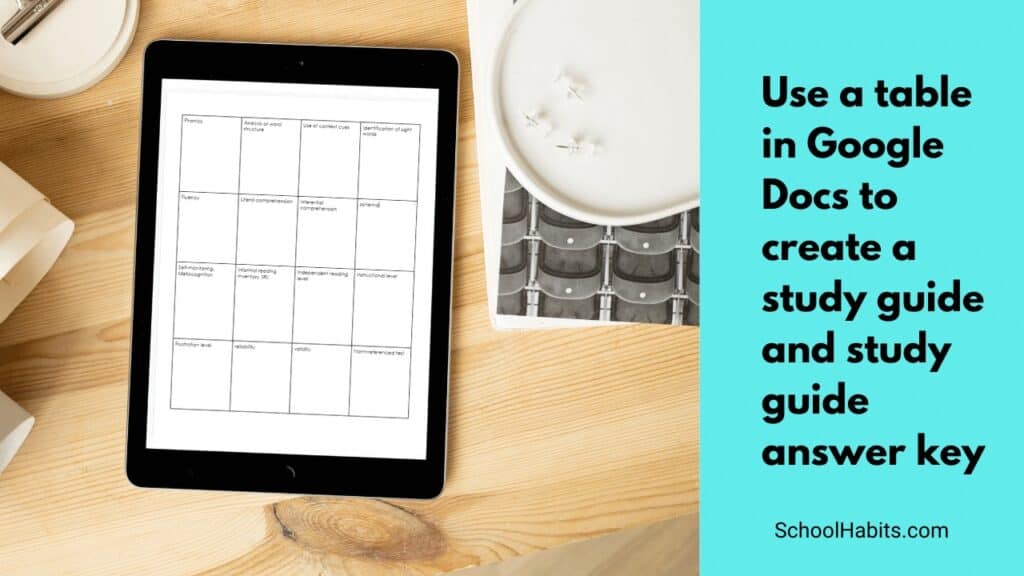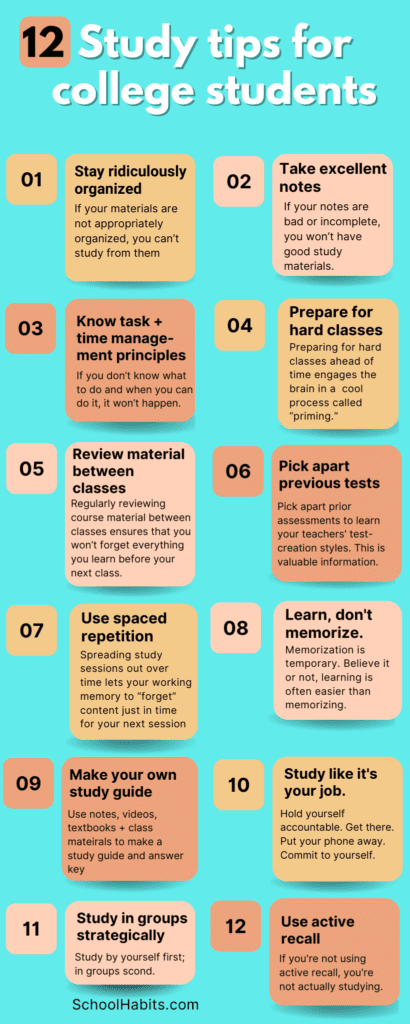
By Katie Azevedo, M.Ed.
Study tips for college students are a little different than study tips for high school students. Of course, the two most critical study strategies in existence apply to students of all ages (I explain these below, so keep reading). But still, college students are up against a few more challenges.
Why you need college-specific study tips
The following list contains the main reasons why studying in college is often harder than studying in high school. Because of these reasons, college students need to adjust their study methods using the strategies in this post.
- College students have less teacher and parental supervision, which means that you – the student- are in charge of your own learning.
- You will have multiple tests and deadlines on the same day. College professors don’t communicate with others the same way high school teachers do. This means they do not coordinate deadlines with your well-being in mind.
- Some college courses are once a week or every few days. This is unlike high school courses that run every day. When classes are less frequent (let’s say twice a week, for example), you have to work harder on your own to keep the content front and center in your memory.
- Let’s face it: College courses are really hard.
12 Study tips for college students
The following list contains study tips and best practices for students in college. I suggest you implement just a few at a time. Once you’re ready to move on, add a few more to your toolbox. I’ve organized the list into two categories: 1) How to study less in college, and 2) College study tips for your actual study sessions.
How to study less in college: 5 tips to decrease how long you have to study
The study tips in this section are all about setting you up to study less in the end. The more you understand the material as you learn it, the less you will have to study it before a test.
1. Stay ridiculously organized.
College is the real deal. You need to get your things in order and find organization systems that work. No one is going to do this for you. If your materials are not appropriately organized, you can’t study from them. Here are some tips for staying organized:
- Name all your digital files properly. Consider using a consistent naming convention like [name of the class + description of file]. For example: Human anatomy skeletal system lab. Never leave documents untitled.
- Get your digital folders in order. I suggest storing digital files no more than two folders deep. For example, in Google Drive, create a folder for each academic year. Then, create individual class folders within those folders.
- If using a digital note-taking app like Notability, match your Notability folder names to your Google Drive folder names.
- Organize your physical papers using the simplest system possible. Consider using one notebook and one folder for each class.
- Organize your notes and materials by unit. At the end of each unit, clip all relevant papers together to form a “unit packet” that you can later study from.
Staying organized pays off not only while you are enrolled in your courses, but also once the semester is over. Here are my 10 essential tips for how to finish a college semester the right way. Check it out once you’re done with the post you’re reading.
2. Take excellent notes.
College professors rarely give out study guides. This means you’ll mostly be studying from your notes. If your notes are bad or incomplete, you won’t have good study materials.
Note-taking in college can be challenging, but you have to figure it out. I have many, many note-taking tutorials that teach you exactly how to take notes. Here are the resources you want to start with:
- How to take notes from a textbook
- How to take notes from a video
- How to take notes in a lecture class
- How to use the Highlight and Rewrite Strategy
3. Know the two foundations of college task and time management.
No amount of college study tips will make up for poor task and time management. If you don’t know what to do and when you can do it, it won’t happen. The two foundations are:
- Having absolute clarity: You must know exactly what is expected of you. When are your tests? When are your quizzes? For what classes? Put those dates on a calendar.
- Planning: You need to get real about the amount of time you truly have to study. Make a weekly schedule and use time blocking to find the exact pockets of time you plan to study. Here’s my complete tutorial for managing time with Google Calendar. You can also use my free Study Planner Template to plan your study sessions. (It’s my free downloadable/printable pdf you can use over and over again.)
4. Prepare for hard classes before class.
I know this tip won’t be popular. But I’m here to be helpful and real, not popular. For particularly challenging college courses, you should prepare for class by doing the readings ahead of time. How is this a study tip for college students? Because the more you understand in class, the less you have to study for the test.
When you prepare for hard classes ahead of time, you engage your brain in a very cool process called “priming.” Priming is an excellent learning method that involves introducing your brain to a topic before fully diving into the material. This enables you to better understand and store the new content.
Ways to prepare for a college class:
- Read my full tutorial here
- Check the syllabus for upcoming class readings and read them before class. Do these 4 things with your syllabus.
- Review your notes from the previous class
5. Review material in between classes.
As I explained in the first section titled Why you need college-specific study tips, many college courses are just once or twice a week. This low frequency (compared to a high school schedule) means that you will need to review the material on your own between classes. No one will tell you to do this and no one will remind you to do this. But it’s what college students do, and it’s necessary.
Regularly reviewing course material between classes ensures that you won’t forget everything you learn before your next class. Again, you might be wondering how this is one of my study tips for college students … ? Because the more you remember your material, the less you will have to study it.
7 college study tips for your actual study sessions
Use the following study methods to prepare for your next test. If you followed the tips from the list above, the whole study process should be less intense. Also, when you’re done reading this post, I want to you read The 4 Most Important Skills You Need in College.
1. Use active recall.
There is no better study method than active recall. For real. If you walk away from this post and only remember one thing, let it be this one. You can learn exactly how to use active recall in my complete guide to using active recall. But, here are some general active recall methods:
- Make and use analog flashcards
- Have a friend verbally test you
- Read questions / prompts and write the answers on paper
- Take multiple practice quizzes (here’s how to make your own quizzes)
- Use digital quiz tools like Quizlet
- Fill in blank study guides over and over
- Fill in blank diagrams/maps/timelines
2. Use spaced repetition.
If you’re using my free Study Planner Template, you will naturally be using spaced repetition. Spaced repetition (which I fully explain here) is the process of spreading out your study sessions over the course of a few days or weeks. Spreading your study sessions out over time allows your working memory to “forget” some of the content just in time for your next session when you will use active recall strategies to remember and review the content. College students must use this study tip to be successful.
3. Study from previous tests and quizzes.
Use your previous tests and quizzes as guides for preparing for the next one. Evaluate how each teacher formats the assessments, what types of questions they ask, and how many questions are pulled directly from class notes. Pick apart prior assessments to learn your teachers’ test-creation styles. This is valuable information.
4. Study by yourself first; then study in groups.
Study groups are common in college. They can be effective if you know exactly how to run a killer group study session, but you’re better off studying by yourself first.
When you study by yourself, you can identify the gaps in your knowledge so that you know what questions to bring to the group. When we study with others, we sometimes mistakenly attribute what they know to what we know. That’s not good.
5. Focus on LEARNING the content, not MEMORIZING it.
Trying to memorize content is a rookie (high school!) mistake. College students must move beyond memorization and actually learn the material. Believe it or not, learning is often easier than memorizing. Here’s the difference between the two, and how to shift from one to the other.
6. Make a killer study guide from your notes and materials.
College professors won’t give you a study guide. You need to know how to make and use your own. Making and using a study guide using the method I teach here forces you to use Active Recall (study tip #1), which you know is the Queen of all study tips.
How to make a study guide:
- Open a Google Doc and go to Insert>Table and make a 5×5 table. You can always add more cells afterward.
- Fill every block with a concept (name, vocab work, idea, date, key term, etc.) from your notes and class materials. Some of these can be questions, such as “Name the 4 primary causes of the Great Depression in America.” Use your textbook chapter review questions, videos, notes, slides, and handouts to find this content. NOTE: Do not include the actual information or answers; just include the idea or word itself. Think of this like what you’d put on the front of a flashcard.
- Print this document. Make at least 5 copies.
- Make a copy of the document by going to File>Make a copy. Name the new copy Study Guide Answer Key.
- This is the hard part: Using ALL your resources, including Google, fill in the study guide with all the answers and information. Be complete. Every cell should have a key term or question at the top of the cell, and the answer/information below it. (See image below.)
- Once you’ve made your complete Study Guide Answer Key, return to the original empty study guide that you printed out. Attempt to fill in as much as you can without looking at your notes or the Answer Key.
- Correct your work using the Answer Key. Then try again.
- Keep trying to fill in your study guide (that’s why you printed so many copies) until you can fill in the entire document without looking at the Answer Key.

7. Study like it’s your job.
Sooo, actually studying is your job in college. Just like with a “real” job, you need to show up and make it happen. When you plan study sessions on your calendar, hold yourself accountable. Get there. Put your phone away. Commit to yourself. Set up your study session in the right environment. Make sure you’re not hungry, thirsty or exhausted. As my favorite NFL coach Bill Belichick would say, do your job.


